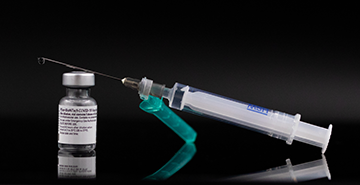
Current recommendations from the CDC for the updated 2023 – 2024 COVID-19 vaccines are that everyone age five and older needs at least one dose and adults who are moderately or severely immunocompromised may need multiple doses; children age six months through four years need at least one dose and may need multiple doses, depending on their situation.
Vaccinations for COVID-19, influenza, and respiratory syncytial virus (RSV) can be scheduled on the web via vaccines.gov at local healthcare facilities and pharmacies. Often they are covered by health insurance but they are also available at no cost through the federal Bridge Access Program for the uninsured and the undocumented. A recent study found that vaccination greatly reduced the chance of long-COVID-19 symptoms by 21% after one dose, 59% after two doses, and 73% after three or more doses.
The SARS-CoV-2 virus that causes COVID-19 continues to mutate, with variant JN.1 particularly on the rise. As of December 9, the CDC estimates JN.1 to account for 21.4% of new US infections, up from 8.1% the prior week, a strong second place to the HV.1 variant, with 29.6%, down from 32.1% the prior week. Despite the way variants are named, JN.1 has only a single change (the additional L455S mutation in the spike protein) from the BA.2.86 variant that has been actively tracked since August. The venerable EG.5 variant was in third place at 8.8%, down from 13.6% the prior week. “The continued growth [in prevalence] of JN.1 suggests that it is either more transmissible or better at evading our immune systems,” the CDC said.
On Dec 20, the World Health Organization (WHO) designated JN.1 as a “variant of interest,” primarily to begin tracking it separately from its parent, BA.2.86: “Based on its genetic features, JN.1 may possess some antigenic advantage evading previous immunity. With the limited data at this stage, the available evidence on JN.1 does not suggest additional public health risks relative to the other currently circulating Omicron descendent lineages. While there is a rapid increase in JN.1 infections, and likely increase in cases, available limited evidence does not suggest that the associated disease severity is higher as compared to other circulating variants. The risk evaluation will be updated as more evidence arises.”
Because of the similarity of all of these common variants descended from Omicron, “COVID-19 tests and treatments [including vaccines] are expected to be effective against JN.1,” the CDC said. “In general, symptoms of COVID-19 tend to be similar across variants. The types of symptoms and how severe they are usually depend more on a person’s immunity and overall health rather than which variant causes the infection.”
The CDC warned that respiratory virus infections are increasing across the board, and the usual seasonal peak yet to come may strain the capacity of healthcare systems in some places. Because of this, the CDC issued an emergency advisory on December 14 emphasizing the need to get vaccinated: “In the past 4 weeks, hospitalizations among all age groups increased by 200% for influenza, 51% for COVID-19, and 60% for RSV.… Influenza, COVID-19, and RSV can result in severe disease, especially among unvaccinated persons. Infants, older adults, pregnant people, and people with certain underlying medical conditions remain at increased risk of severe COVID-19 and influenza disease. Infants and older adults remain at highest risk of severe RSV disease; it is the leading cause of infant hospitalization in the United States.”
Cumulatively so far, the US experienced 1,159,864 deaths and 6,569,418 hospitalizations due to COVID-19; RI experienced 4,261 deaths and 22,517 hospitalizations. Out of a population of about one million, RI has lost about one-half of one percent, or one of every 200 people, to death from COVID-19.
Nationally, as of November 2023, COVID-19 remains the eigth leading cause of death (3,504), behind heart disease (1st, 45,428), cancer (2nd, 44,083), and stroke (3rd, 11,889), but well ahead of influenza and pneumonia (12th, 2,919).
In RI, COVID-19 deaths and hospitalizations are steeply declining month-to-month, as of December 14 (5 deaths, 65 hospitalizations) at a rate about one-half November (20 deaths, 229 hospitalizations) and onethird October (29 deaths, 248 hospitalizations), but COVID-19 continues to account for 1.5% of hospital emergency room visits. Vaccination rates in RI for the most recent 2023 – 2024 booster are 14% overall, but among the most vulnerable they are significantly higher: 42% for age 65 and older.